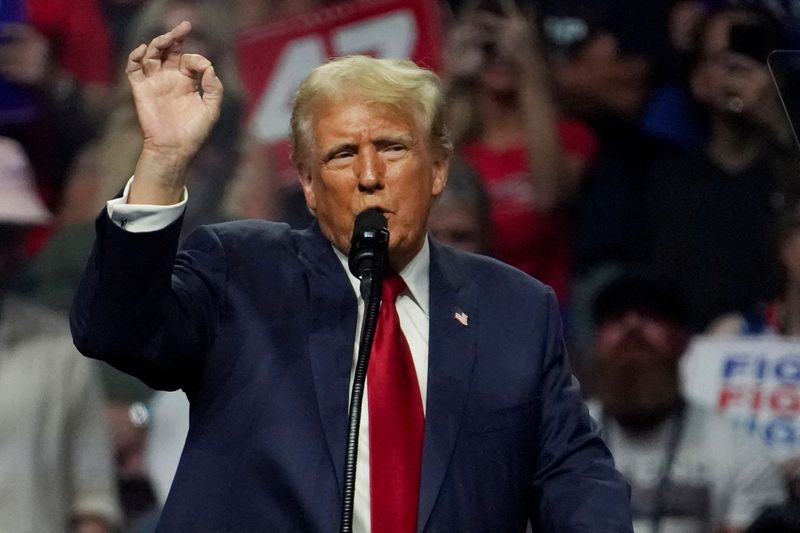S&P, Nasdaq edge higher with gold spike, FOMC minutes in focus
Investing.com -- On Tuesday, September 10, former President Donald Trump took the stage in a debate against Vice President Kamala Harris.
The outcome was widely regarded as a major setback for Trump, with many commentators labeling his performance as disastrous.
“Despite the disastrous performance by former President Trump in the debate with Vice President Kamala Harris, there are still paths for him to come back to power,” the analysts said.
BCA flags that Trump's debate failure likely swung some momentum toward the Democrats, with their models now reflecting a 56% probability of a Democratic victory.
This matches past trends, where sitting presidents usually have a better chance of winning if the economy is not in a recession during the election year.
The post-debate narrative has boosted the perception that the Democrats are well-positioned to retain control of the White House, with potential gains in Congress.
However, BCA cautions that this seemingly straightforward narrative does not account for the fluid nature of electoral dynamics.
In their view, the road to November remains highly uncertain and ripe with opportunities for Trump to regain lost ground.
One of the key elements of BCA's mentioned is the economy, a perennial factor in U.S. elections that can reshape voter preferences.
“The economy and global instability could flare up anytime between now and election day, while quirks in the Electoral College ensure that the election will be close,” the analyst said.
Unemployment is already ticking up, particularly in battleground states like Georgia, Michigan, and Ohio. This economic downturn could shift the focus away from Trump’s debate performance and onto broader concerns about economic stability, which may play into his hands.
A potential recession, coupled with stock market volatility, could create a political climate in which voters gravitate toward Trump's message on economic recovery and job creation.
Another important factor working in Trump’s favor is the unique structure of the U.S. Electoral College, which often distorts the popular vote in close races.
Even if Trump fails to secure a majority of the national vote, his path to victory remains plausible through key swing states.
“If Trump wins Michigan, Arizona, and one other swing state, only three faithless electors would be required,” the analysts said, which means electors who defy the outcome of their state's popular vote.
In such a scenario, Trump could find himself with fewer than 270 electoral votes but still in a position to trigger a contingent election, which would be decided by the House of Representatives, where Republicans control a majority of state delegations.
This quirk in the system provides Trump with a critical backdoor to victory, one that cannot be discounted in such a volatile political environment.
Beyond the domestic landscape, global instability is another factor that could influence the election. BCA highlights the increasing risk of crises abroad, particularly involving Russia’s ongoing conflict with Ukraine and rising tensions in the Middle East, notably between Israel and Iran.
Should global tensions escalate, voters may shift their attention to foreign policy, an area where Trump could potentially capitalize on dissatisfaction with the Biden-Harris administration’s handling of international affairs.
“Hence it is imperative for Putin to attempt to embarrass the Biden-Harris administration and cultivate party change and continued US and NATO divisions,” the analysts said.
Such developments could reframe the election debate and offer Trump an unexpected opportunity to appeal to voters concerned about global security and U.S. leadership on the world stage.
The race for control of Congress further complicates the political landscape. While the Democrats are currently seen as favorites to retain the presidency, BCA stresses that the Senate and House elections could still tilt in favor of the Republicans.
The Senate map, in particular, is fraught with challenges for the Democrats, who are likely to lose key races in West Virginia, Montana, and Ohio.
A GOP-controlled Senate would create significant gridlock, especially if the House also swings Republican. This dynamic could have major implications for the next administration’s ability to govern effectively, and could influence voters who prefer divided government over a single-party sweep.
BCA notes that this potential for gridlock is something investors may welcome, especially amid fears of tax hikes and market volatility under a unified Democratic government.
Ultimately, while BCA Research acknowledges the damage Trump sustained in his debate with Harris, they emphasize that the election remains unpredictable and competitive.
The combination of economic concerns, electoral college peculiarities, and global instability presents Trump with several potential avenues to stage a comeback.
Although the odds may currently favor the Democrats, the situation is fluid, and policy uncertainty will likely persist in the weeks leading up to election day.
